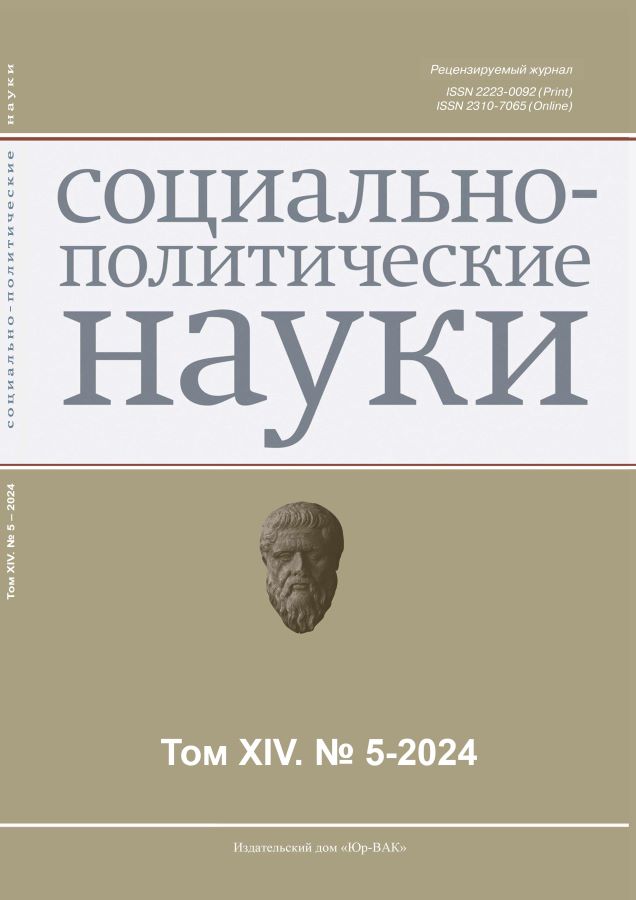State-civilization – geopolitical status of Russia
- Authors: Belkov O.A.1
-
Affiliations:
- Zhirinovsky University of World Civilizations
- Issue: Vol 14, No 5 (2024)
- Pages: 38-45
- Section: Political Institutions, Processes and Technologies
- URL: https://journals.eco-vector.com/2223-0092/article/view/655478
- DOI: https://doi.org/10.33693/2223-0092-2024-14-5-38-45
- EDN: https://elibrary.ru/RARUIQ
- ID: 655478
Cite item
Abstract
The work is a phenomenological analysis of the concept “Russia is an original state-civilization”. This formula represents the civilizational self-determination of the State. It lapidarily defines his understanding of his own development and the desirable principles of the world order. The article attempts to find out its heuristic value. The history of the term “state-civilization” is revealed. It is proved that it acts along with civilization and the state as a specific social community and a sovereign subject of geopolitics. Its historicity, the mechanism of formation and development are indicated. The general features of the civilizational states and the substantive characteristics of the Russian civilizational state, its main features and peculiarities are revealed. The special role of the state-forming Russian people in the destinies of Russia is emphasized. Russianness is one of the main characteristics of the Russian state-civilization. The applied meaning of the concept in question is discussed in detail. In particular, the concepts of the clash of civilizations and the synergy of civilizations are discussed. At the same time, the reasons for the eternal and periodically escalating relations between Russia and the antagonistic Western civilization and the impossibility of integration with it are explained.
Keywords
Full Text
About the authors
Oleg A. Belkov
Zhirinovsky University of World Civilizations
Author for correspondence.
Email: belkovole@yandex.ru
SPIN-code: 4328-2213
Dr. Sci. (Philos.), professor
Russian Federation, MoscowReferences
- Berdyaev N. Russian idea. St. Petersburg: ABC classics, 2008. 318 p.
- Bulavina M.A., Novoselsky S.O. Prospects for Russia’s military security in the current geopolitical conjuncture. In: Interstate confrontation in the context of globalization and its impact on the management of national defense of the Russian Federation. Moscow, 2023. Pp. 105–112.
- Goryacheva M.A. Dynamics of Russian language proficiency in the Russian Federation according to the population censuses of 1989–2020. Sociolinguistics. 2023. No. 1 (13). Pp. 30–48. (In Rus.)
- Grachev B.V. The civilizational choice of Russia: A Eurasian alternative. Sociodynamics. 2022. No. 8. Pp. 38–52. (In Rus.)
- Danilevsky N.Ya. Russia and Europe. Moscow: Yurait, 2023. 453 p.
- Lenin V.I. The initial outline of theses on national and colonial issues. In: Complete collection of works. Vol. 41. Moscow: Politizdat, 1981. 23 p.
- Lopukha A.D. Civilizational and social choice of Russia. Humanitarian Problems of Military Affairs. 2023. No. 3 (36). Pp. 9–12. (In Rus.)
- Partz L. In search of the true Russia. The province in modern nationalist discourse. Moscow: Academic Studies Press, 2022. 247 p.
- Huntington S. The clash of civilizations and the transformation of the world order. Transl. from English: Yu. Novikov (chapters 1–8), E. Krivtsova (ed.), T. Velimeev (chapters 9–12); K. Korolev (gen. ed.). Moscow: Center for Humanitarian Technologies, 2003. URL: https://gtmarket.ru/library/basis/3893 (data of accesses: 20.07.2024).
- Chaadaev P.Ya. The complete collection of works and selections letters. Moscow, 1991. Vol. 1. Pp. 323–326.
- Shubart V. Europe and the soul of the East. Z.G. Antipenko, M.V. Nazarova (transl. from Germany). 2rd ed., edit. Moscow: Russian Idea, 2000. 446 p.
Supplementary files









